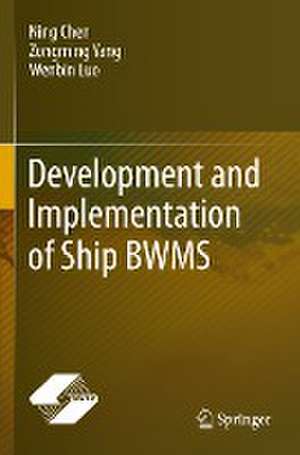Development and Implementation of Ship BWMS
Autor Ning Chen, Zongming Yang, Wenbin Luoen Limba Engleză Paperback – 16 apr 2022
| Toate formatele și edițiile | Preț | Express |
|---|---|---|
| Paperback (1) | 890.06 lei 6-8 săpt. | |
| Springer Nature Singapore – 16 apr 2022 | 890.06 lei 6-8 săpt. | |
| Hardback (1) | 951.29 lei 6-8 săpt. | |
| Springer Nature Singapore – 16 apr 2021 | 951.29 lei 6-8 săpt. |
Preț: 890.06 lei
Preț vechi: 1085.44 lei
-18% Nou
Puncte Express: 1335
Preț estimativ în valută:
170.31€ • 177.82$ • 140.96£
170.31€ • 177.82$ • 140.96£
Carte tipărită la comandă
Livrare economică 05-19 aprilie
Preluare comenzi: 021 569.72.76
Specificații
ISBN-13: 9789813368675
ISBN-10: 9813368675
Pagini: 285
Ilustrații: IX, 285 p. 233 illus., 172 illus. in color.
Dimensiuni: 155 x 235 mm
Greutate: 0.42 kg
Ediția:1st ed. 2021
Editura: Springer Nature Singapore
Colecția Springer
Locul publicării:Singapore, Singapore
ISBN-10: 9813368675
Pagini: 285
Ilustrații: IX, 285 p. 233 illus., 172 illus. in color.
Dimensiuni: 155 x 235 mm
Greutate: 0.42 kg
Ediția:1st ed. 2021
Editura: Springer Nature Singapore
Colecția Springer
Locul publicării:Singapore, Singapore
Cuprins
Introduction.- Ship ballast water management system.- Working Principle of ballast water management system.- The key components of the system and the working principle of the unit.- Design method of key components.- Optimization of key components.- Development of control system for ballast water management system.- Maintenance and management of ballast water management system.- Implementation of ballast water management system on ships.
Notă biografică
Ning CHEN, Professor, born in October, 1963, Director of the Institute of Marine Turbine System and Equipment, graduated from Jiangsu University of Science and Technology with a master’s degree of Engineering in Mechanical Manufacture in 1996. He is engaged in marine engineering, a senior member of China society of naval architecture and marine engineering computer application committee members, member of the professional committee on the integration of shell outfitting and coating, and Deputy Director of committee members of Jiangsu shipbuilding turbine engineering association.
Zongming YANG, Associate Professor, graduated from Harbin Institute of Marine Engineering in 1989 with a master’s degree in Marine Power Plant. He is currently the head of the Department of Power Engineering at the School of Energy and Power, Jiangsu University of Science and Technology. He focuses mainly on marine power systems, power plants and energy conservation research. He has participated in a number of international cooperation projects.
Zongming YANG, Associate Professor, graduated from Harbin Institute of Marine Engineering in 1989 with a master’s degree in Marine Power Plant. He is currently the head of the Department of Power Engineering at the School of Energy and Power, Jiangsu University of Science and Technology. He focuses mainly on marine power systems, power plants and energy conservation research. He has participated in a number of international cooperation projects.
Textul de pe ultima copertă
This book introduces the components and principles of the common ballast management systems. The working principles of different filtration, cleaning and sterilizing equipment are also introduced. The calculation norm of the construction design and the calculation method of simulation are described. Besides, different aspects of system management are analyzed. The principle of various detecting sensors, the hardware of control system and the design method of human–computer interface are respectively introduced. Last but not least, the maintenance and management of ballast water management system are described, mainly the maintenance and management of key components which composes the system.
Caracteristici
Is the first book focuses on introduction of the design and calculation methods of each link unit of BMWS
Introduces the structural design characteristics of each unit component of BMWS
Presents the structural optimization methods of each unit component of BMWS
Introduces the structural design characteristics of each unit component of BMWS
Presents the structural optimization methods of each unit component of BMWS
